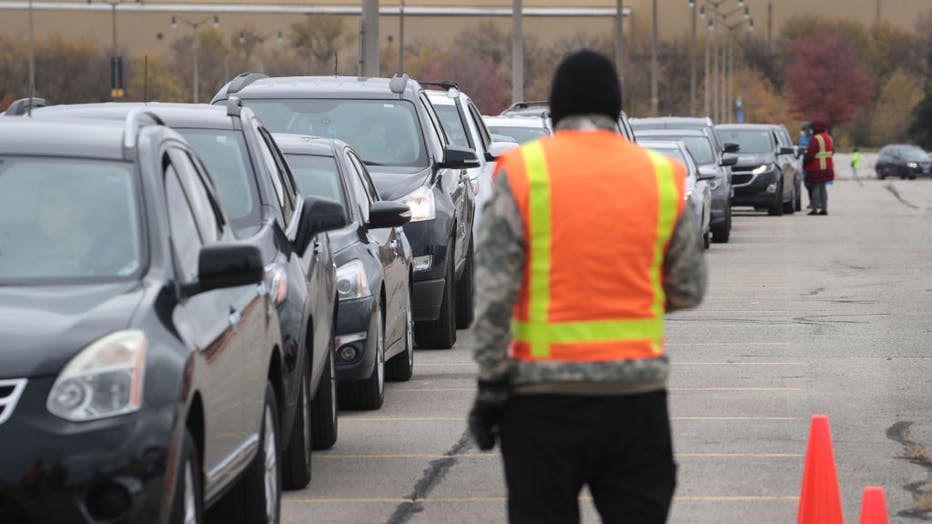US records highest number of daily COVID-19 cases since onset of pandemic
LOS ANGELES - The U.S. recorded the highest-ever number of new COVID-19 cases in one day with 88,251 counted Thursday — more than any other day since the first U.S. case was counted on Jan. 21.
Thursday’s death toll approached 1,000, with 971 deaths recorded, bringing the total death count in the U.S. to more than 229,000.
On Friday, the United States surpassed 9 million confirmed COVID-19 cases, according to data from Johns Hopkins University, as health officials prepared for what they say may be a devastating winter amid the recent surge of cases in the country.
The U.S. added 500,000 COVID-19 cases in just one week, breaking yet another record. In that span, the U.S. averaged roughly 71,000 new cases per day, the New York Times reported.
Despite the rise in infections, officials in many U.S. states being hit hard by the virus are resisting taking stronger action to stop the spread, even as the fall resurgence strains hospitals.
The number of new infections reported daily is on the rise in 47 states. They include Nebraska and South Dakota, where the number of new cases topped previous highs for each state.
RELATED: Taiwan marks 200 days without domestic COVID-19 infection

Residents line up at a mobile COVID-19 test center staffed by members of the Wisconsin National Guard on the grounds of Miller Park on October 29, 2020 in Milwaukee, Wisconsin. (Photo by Scott Olson/Getty Images)
The record increases in new cases have eclipsed the spikes that set off national alarms last spring and summer. During those outbreaks, first in the Northeast and then in Sun Belt states, many governors closed schools and businesses and restricted public gatherings.
Over the past two weeks, more than 76,000 new virus cases have been reported daily in the U.S. on average, up from about 54,000 in mid-October, according to Johns Hopkins University. Deaths, which usually lag case numbers and hospitalizations, are also rising, from about 700 to more than 800 a day.
Nevertheless, many officials have resisted calls to enact measures like statewide mask mandates or stricter curbs on the size of gatherings, casting the response to the virus as a matter of individual decision-making.
“At the end of the day, personal responsibility is the only way. People will either choose or not choose to social distance, or choose to wear a mask or not,” said Tennessee Gov. Bill Lee, a Republican. “What we can do is to remind them is that personal responsibility can protect them.”
Lee's state is among those without a blanket mask mandate, despite a study released this week showing that areas of Tennessee where people are not required to wear them are seeing the most hospitalizations.
In Iowa, where a record 606 coronavirus patients were hospitalized Friday, one health expert said officials there had been too quick to reopen, along with several neighboring states.
“If we follow the course that the other Midwestern states like Wisconsin, North Dakota and South Dakota have, we’re going to have trouble keeping up,” said Dr. Ravi Vemuri, an infectious disease specialist at MercyOne hospitals.
Republican Gov. Kim Reynolds, who has rejected mask requirements and said Iowans must learn to live with the virus, continued this week to downplay efforts to contain it.
Kansas Gov. Laura Kelly, a Democrat, has repeatedly tried to impose restrictions but been stymied by the Republican-controlled legislature. She is considering calling lawmakers into a special session to impose a statewide mask mandate.
In Wisconsin, where the virus has raged since September, Democratic Gov. Tony Evers pleaded with residents this week to shelter in place to slow the spread. Evers issued a formal stay-at-home order in March, but the state's conservative Supreme Court struck it down in May. He was subsequently sued over a mask mandate and limits on gatherings in bars and restaurants.
In Utah, Republican Gov. Gary Herbert has ordered mask mandates and limited social gatherings to 10 people or fewer only in counties with the highest transmission rates, not the entire state. The latter measure includes exceptions for religious services and school events.
“This is not an easy thing to enforce. As you drive down the road, you talk about people getting tickets for speeding, but how many are actually speeding?" Herbert said when asked about his resistance to broader mandates.
The Associated Press contributed to this story.


